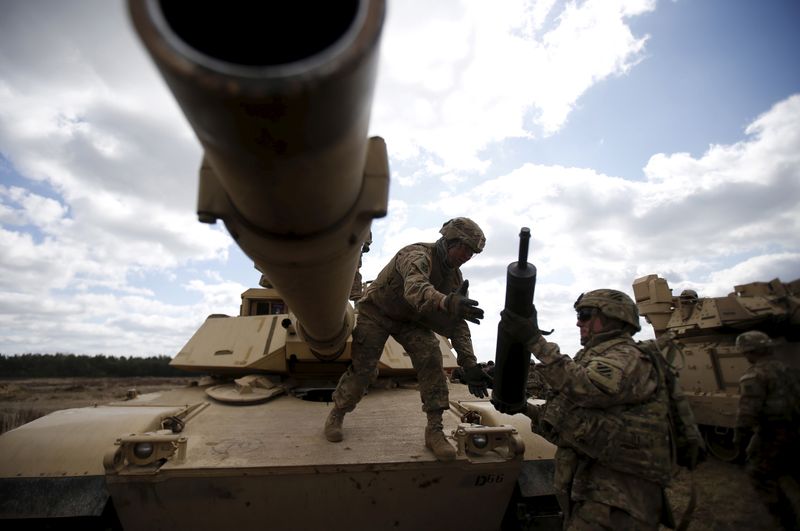By Mike Stone
WASHINGTON (Reuters) - The Biden administration will for the first time send controversial armor-piercing munitions containing depleted uranium to Ukraine, according to a document seen by Reuters and separately confirmed by two U.S. officials.
The rounds, which could help destroy Russian tanks, are part of a new military aid package for Ukraine set to be unveiled in the next week. The munitions can be fired from U.S. Abrams tanks that, according to a person familiar with the matter, are expected be delivered to Ukraine in the coming weeks.
One of the officials said that the coming aid package will be worth between $240 million and $375 million depending on what is included.
The value and contents of the package were still being finalized, the officials said. The White House did not immediately respond to a request for comment.
Although Britain sent depleted uranium munitions to Ukraine earlier this year, this would be the first U.S. shipment of the ammunition and will likely stir controversy. It follows an earlier decision by the Biden administration to provide cluster munitions to Ukraine, despite concerns over the dangers such weapons pose to civilians.
The use of depleted uranium munitions has been fiercely debated, with opponents like the International Coalition to Ban Uranium Weapons saying there are dangerous health risks from ingesting or inhaling depleted uranium dust, including cancers and birth defects.
A by-product of uranium enrichment, depleted uranium is used for ammunition because its extreme density gives rounds the ability to easily penetrate armor plating and self-ignite in a searing cloud of dust and metal.
While depleted uranium is radioactive, it is considerably less so than naturally occurring uranium, although particles can linger for a considerable time.
The United States used depleted uranium munitions in massive quantities in the 1990 and 2003 Gulf Wars and the NATO bombing of former Yugoslavia in 1999.
The U.N. nuclear watchdog, the International Atomic Energy Agency, says that studies in former Yugoslavia, Kuwait, Iraq and Lebanon "indicated that the existence of depleted uranium residues dispersed in the environment does not pose a radiological hazard to the population of the affected regions."
Still, the radioactive material could add to Ukraine's massive post-war clean-up challenge. Parts of the country are already strewn with unexploded ordnance from cluster bombs and other munitions and hundreds of thousands of anti-personnel mines.
The Wall Street Journal reported in mid-June the U.S. was considering sending depleted uranium rounds to Ukraine.
Recent weapons aid packages for Ukraine have included artillery, air defense missiles and ground vehicles as Ukraine's counteroffensive grinds on. Reuters was unable to determine what else the package contained besides the depleted uranium rounds.

Funding authorization for the aid package comes through the Presidential Drawdown Authority, which authorizes the president to transfer articles and services from U.S. stocks without congressional approval during an emergency. The material will come from U.S. excess inventory.
The security assistance for Ukraine since the full-scale Russian invasion in February 2022 has been more than $43 billion.